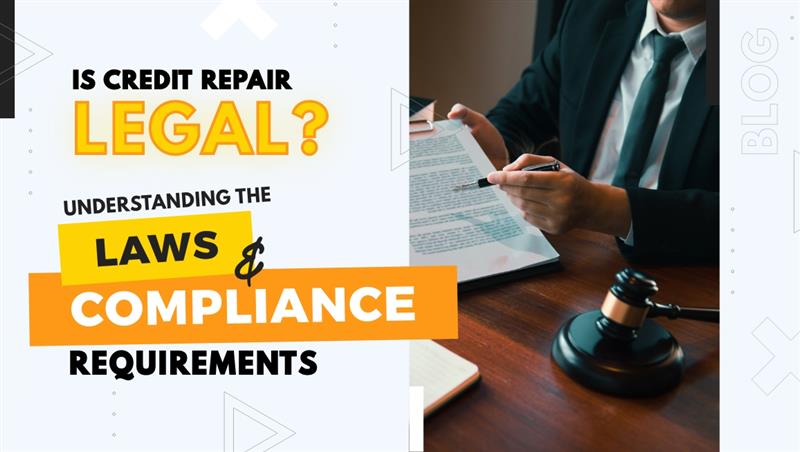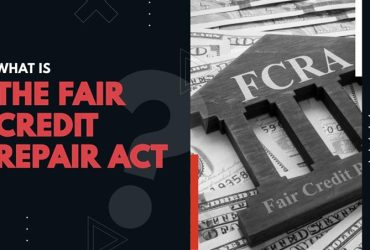Is Credit Repair Legal? Understanding the Laws & Compliance Requirements
by Almas Tariq
March 30, 2025
06:54 PM

The demand for credit repair services has grown significantly as more consumers seek to improve their credit scores for better financial opportunities. With lenders heavily relying on credit reports for loan approvals, credit repair businesses play a vital role in helping individuals correct inaccuracies, rebuild their credit profiles, and regain financial stability. However, despite the increasing need for these services, many people still question whether credit repair is legal, often due to misinformation or unethical practices by certain companies in the past.
Understanding the legal framework surrounding credit repair is essential for both businesses and consumers. While credit repair is completely legal, it must be conducted in compliance with federal and state laws designed to protect consumers from fraud and misleading practices. Regulations like the Credit Repair Organizations Act (CROA) and the Fair Credit Reporting Act (FCRA) set clear guidelines for how credit repair businesses can operate, ensuring transparency, honesty, and fair treatment for clients. This blog will break down these laws, clear up misconceptions, and provide insights into how credit repair companies can stay compliant while offering valuable services.
-
Understanding Credit Repair Laws
The credit repair industry operates under strict regulations to protect consumers and ensure ethical business practices. Credit repair businesses must comply with several federal laws to maintain legitimacy and avoid penalties. Understanding these regulations is essential for providing legal and effective credit repair services.
The government enforces laws to prevent misleading claims, fraudulent activities, and unfair business practices. Credit repair businesses that fail to comply with these laws risk severe consequences, including lawsuits, fines, and business shutdowns. By following federal regulations, businesses can build trust with clients and establish a strong reputation in the industry.
Key Federal Laws Governing Credit Repair Businesses
Several federal laws regulate credit repair businesses, ensuring they operate fairly and transparently. The most important laws include:
- Credit Repair Organizations Act (CROA): This law sets clear guidelines on how credit repair companies can operate, prohibiting deceptive practices and requiring full disclosure to clients.
- Fair Credit Reporting Act (FCRA: The FCRA gives consumers the right to dispute inaccurate credit information and outlines the responsibilities of credit bureaus in the credit reporting process.
- Telemarketing Sales Rule (TSR): This rule restricts how credit repair businesses can sell their services, banning upfront payments before services are fully performed.
- Gramm-Leach-Bliley Act (GLBA): Credit repair businesses handling consumer financial information must follow GLBA regulations to protect client data.
- Federal Trade Commission (FTC) Guidelines: The FTC monitors credit repair companies and enforces regulations to prevent fraud and deceptive marketing practices.
Each of these laws plays a vital role in protecting consumers and maintaining ethical business practices. Failing to comply with them can lead to investigations, legal action, and financial losses.
The Importance of Compliance in Credit Repair
Compliance is more than just following legal requirements—it is the foundation of a sustainable and trustworthy credit repair business. Credit repair companies must ensure they:
- Use transparent advertising and avoid false claims. Businesses cannot promise a specific credit score increase or guarantee results.
- Follow legal billing practices. Collecting payment before delivering services violates the TSR and can result in penalties.
- Protect client information. Sensitive consumer data must be securely stored to prevent breaches and identity theft.
- Provide accurate information to clients. Credit repair professionals must educate clients on their rights and set realistic expectations about the dispute process.
Credit repair businesses that prioritize compliance not only avoid legal trouble but also build a strong reputation. Consumers are more likely to trust a company that follows ethical practices, leading to long-term success and growth in the industry.
The Credit Repair Organizations Act (CROA)
The Credit Repair Organizations Act (CROA) is a federal law that regulates credit repair businesses to protect consumers from deceptive practices. Enacted in 1996, CROA establishes guidelines for how credit repair companies can advertise, charge for services, and communicate with clients. The law ensures that consumers receive clear and honest information about the services they are paying for.
Credit repair businesses must comply with CROA to operate legally and avoid penalties. Failure to follow its guidelines can lead to lawsuits, regulatory fines, and damage to the company’s reputation. Understanding and adhering to CROA is essential for running a credit repair business that is both ethical and compliant.
Key Provisions of CROA, Including Disclosure Requirements and Prohibited Practices
CROA outlines specific rules that all credit repair businesses must follow. These regulations are designed to prevent misleading claims, hidden fees, and other deceptive business practices.
Key provisions include:
- No upfront fees – Credit repair businesses cannot charge customers before completing the promised services. Payments must be collected only after the service has been performed.
- Written contract requirement – All credit repair businesses must provide clients with a written contract that clearly details the services offered, pricing, and expected results.
- Mandatory cancellation period – Clients must have the right to cancel their contract without penalty within three business days of signing.
- Prohibition of false claims – Credit repair companies cannot guarantee a specific credit score improvement or promise to remove accurate negative items from a credit report.
- Disclosure of consumer rights – Businesses must provide clients with a document explaining their rights under CROA, including their ability to dispute credit report errors on their own.
Violating these provisions can result in severe penalties, including legal action by the Federal Trade Commission (FTC), lawsuits from consumers, and potential business closure.
How Credit Repair Businesses Can Stay Compliant with CROA Regulations
Staying compliant with CROA is crucial for the long-term success of any credit repair business. Ensuring compliance protects the business from legal risks and builds trust with clients.
Best practices for compliance include:
- Use transparent marketing – Avoid misleading advertising and never promise guaranteed credit score increases or guaranteed removals of negative items.
- Provide clear contracts – Ensure all agreements include required disclosures, service details, and the right-to-cancel notice.
- Follow proper billing practices – Never charge clients before completing services; always collect payments after work has been performed.
- Educate clients on their rights – Provide the legally required consumer rights disclosure to all clients before starting services.
- Monitor compliance regularly – Train staff on CROA regulations and review business practices frequently to ensure adherence to all legal requirements.
By following these steps, credit repair businesses can maintain compliance with CROA while providing ethical and effective credit repair services to their clients.
Fair Credit Reporting Act (FCRA) & Consumer Rights
The Fair Credit Reporting Act (FCRA) is a crucial law that governs how credit information is collected, reported, and used. This law protects consumers from inaccurate, outdated, or misleading credit data that can affect their financial opportunities. For credit repair businesses, understanding the FCRA is essential for ensuring legal compliance and helping clients navigate credit disputes effectively.
FCRA sets strict guidelines for credit reporting agencies, lenders, and businesses that access consumer credit reports. It gives consumers specific rights when dealing with credit bureaus and ensures that credit information remains accurate and fairly reported. Credit repair businesses must follow these rules when assisting clients in disputing negative or incorrect items on their reports.
How the FCRA Regulates Credit Reporting and Disputes
The FCRA establishes strict rules to ensure that consumer credit reports remain fair, accurate, and private. It regulates the way credit information is collected and shared, ensuring that only relevant and verifiable data appears on a consumer’s report.
Here’s how the FCRA impacts credit reporting and dispute resolution:
- Accuracy Requirements: Credit bureaus must maintain accurate and up-to-date information in consumer credit reports. They must remove or correct any information that is proven to be inaccurate.
- Right to Dispute Errors: Consumers have the right to dispute any incorrect, outdated, or unverifiable information on their credit reports.
- Timely Investigation Process: Once a dispute is submitted, credit bureaus must investigate and respond within 30 days.
- Limitations on Negative Information: Certain negative records, such as bankruptcies or late payments, must be removed after a specific time.
- Data Privacy Protection: Access to credit reports is restricted to businesses and institutions with a legitimate purpose, such as lenders, landlords, and employers.
Understanding FCRA regulations helps credit repair businesses ensure they follow legal guidelines while assisting clients with credit disputes. It also allows businesses to educate clients on their rights and empower them to take control of their credit health.
The Role of Credit Bureaus in Credit Repair
Credit bureaus are responsible for collecting, maintaining, and distributing credit information. The three major credit bureaus in the U.S. are Equifax, Experian, and TransUnion. These agencies receive data from creditors, lenders, and collection agencies, then use this data to generate credit reports.
Credit repair businesses frequently interact with credit bureaus when disputing errors on behalf of their clients. Here’s how credit bureaus play a role in credit repair:
- Data Collection: Credit bureaus collect financial data from banks, credit card companies, and other lenders.
- Report Generation: They compile credit reports that lenders use to evaluate a consumer’s creditworthiness.
- Dispute Handling: When consumers dispute inaccuracies, credit bureaus must investigate and remove unverifiable information.
- Credit Score Calculation: While bureaus don’t generate scores, they provide credit data to scoring models like FICO and VantageScore.
Since credit bureaus control credit data, credit repair businesses must communicate effectively with them to resolve disputes efficiently. Ensuring that disputes follow FCRA guidelines increases the likelihood of successful removals or corrections.
Understanding Consumer Rights Under the FCRA
Consumers have specific rights under the FCRA that protect them from unfair credit reporting practices. These rights are essential for ensuring that individuals have access to accurate credit information and can take action against errors.
Some of the most important consumer rights under the FCRA include:
- Right to a Free Credit Report: Consumers can request a free credit report once a year from each of the three major credit bureaus through AnnualCreditReport.com.
- Right to Dispute Inaccuracies: If a consumer finds incorrect information on their report, they have the right to dispute it and have it corrected or removed.
- Right to Know Who Accessed Their Report: Consumers can see a list of entities that have checked their credit, helping them monitor for unauthorized access.
- Right to Remove Old Negative Items: Most negative items must be removed from a credit report after a set number of years (e.g., late payments after seven years, bankruptcies after ten).
- Right to Limit Access to Credit Reports: Consumers can restrict access to their credit reports through security freezes or fraud alerts.
Credit repair businesses must educate clients about these rights and guide them through the process of exercising them. Understanding the FCRA allows businesses to provide compliant, ethical credit repair services that genuinely help clients improve their financial standing.
Telemarketing Sales Rule (TSR) & Compliance in Marketing
Marketing plays a vital role in the success of any credit repair business, but strict regulations govern how companies can promote their services. The Telemarketing Sales Rule (TSR) is one of the most important laws affecting credit repair businesses, specifically restricting how they engage with consumers through phone-based marketing. Understanding the TSR helps credit repair businesses avoid penalties and ensures they operate within legal boundaries while attracting new clients.
The Federal Trade Commission (FTC) enforces the TSR to prevent deceptive and abusive telemarketing practices. The rule applies to credit repair businesses that use phone calls to market services, whether through direct calls, robocalls, or third-party sales representatives. Failure to comply with the TSR can lead to hefty fines and legal consequences, making it essential for businesses to align their marketing strategies with federal requirements.
What is the TSR and How Does It Apply to Credit Repair Businesses?
The TSR was established to protect consumers from fraudulent and misleading telemarketing practices. It outlines specific rules that telemarketers, including credit repair companies, must follow to ensure ethical marketing and sales.
For credit repair businesses, the TSR applies in several key areas:
- Upfront Payment Restrictions – Credit repair businesses cannot charge clients before providing services. The TSR prohibits accepting payments until clients receive a written credit report with verified results.
- Misleading Sales Tactics – The TSR bans deceptive statements about credit repair results, timelines, or guarantees. Businesses cannot promise a specific credit score increase or removal of accurate negative information.
- Consent Requirements – Credit repair companies must obtain explicit consent before contacting consumers via phone. They must also maintain a Do-Not-Call list and honor consumer preferences.
- Robocall Regulations – The TSR strictly limits the use of automated voice messages and prerecorded calls for marketing credit repair services. Unsolicited robocalls are prohibited unless the consumer has given prior written consent.
Prohibited Practices Under TSR, Including Upfront Payments
The TSR has strict guidelines to prevent credit repair businesses from engaging in unfair marketing tactics. Violating these rules can lead to significant fines and legal action.
Key prohibited practices under the TSR include:
- Charging Fees Before Providing Services – Credit repair businesses cannot request or accept upfront payments before demonstrating results. Clients must first receive proof of service completion in writing.
- False or Misleading Claims – Companies cannot claim they can remove all negative items from a credit report or promise guaranteed credit score improvements.
- Deceptive Marketing and Advertising – Credit repair companies must provide accurate information about their services and avoid exaggerated claims that mislead consumers.
- Failure to Disclose Key Information – Businesses must clearly explain pricing, service terms, expected results, and any limitations before signing up a client.
Ensuring Compliant Sales and Marketing Strategies
Credit repair businesses must adopt marketing strategies that comply with the TSR while remaining effective in attracting potential clients. A well-structured approach helps businesses stay compliant while maintaining strong customer relationships.
To ensure compliance with the TSR, credit repair businesses should:
- Avoid Cold Calling Without Consent – Businesses must only contact consumers who have explicitly opted in or shown interest in their services.
- Use Transparent Marketing Language – Clearly explain the credit repair process, expected timelines, and realistic outcomes without making false promises.
- Provide Written Agreements Before Payment – All services must be documented in a written contract, and no payments should be accepted before services are completed.
- Monitor Marketing Campaigns – Regularly review advertisements, call scripts, and promotional materials to ensure they align with TSR guidelines.
- Implement a Strong Compliance System – Using compliance-focused credit repair business software can help businesses track customer interactions, maintain consent records, and automate legal disclosures.
By following these best practices, credit repair businesses can market their services legally while building trust with potential clients. The TSR may impose strict restrictions, but companies that prioritize compliance and transparency will stand out as ethical and reliable credit repair providers.
-
State-Level Credit Repair Regulations
Credit repair businesses must comply with both federal and state regulations. While federal laws like the Credit Repair Organizations Act (CROA) and the Fair Credit Reporting Act (FCRA) apply nationwide, each state has its own laws that may impose additional requirements. Some states have stricter rules to protect consumers from fraudulent credit repair services, making compliance a key factor in operating legally.
Failing to understand and follow state-specific regulations can result in legal penalties, fines, or even business shutdowns. Therefore, credit repair companies must stay updated on state laws and adapt their business operations accordingly. Since state regulations may change over time, it is essential to monitor updates and seek legal guidance when expanding services to new states.
How State Laws Differ from Federal Regulations
Although federal laws set a baseline for consumer protection, some states enforce additional restrictions on credit repair businesses. These state-level regulations may include:
- Licensing and registration requirements for credit repair companies.
- Bonding obligations to ensure consumer protection.
- Restrictions on fees and payment structures.
- Additional disclosures or contract terms required for consumers.
- Prohibitions on certain types of advertising claims or marketing strategies.
For example, some states require credit repair companies to obtain a license before operating, while others impose limits on how much they can charge for services. A few states even prohibit credit repair businesses altogether unless they operate as nonprofit organizations or attorneys providing financial assistance.
Licensing and Bonding Requirements in Certain States
Several states require credit repair businesses to obtain a license or register with state agencies before offering services. Licensing ensures that companies meet specific ethical and financial standards, helping to prevent fraudulent practices. Additionally, some states mandate credit repair companies to post a surety bond—a financial guarantee that protects consumers in case of misconduct or service failure.
Key licensing and bonding requirements may include:
- State-Specific Licenses: Some states require credit repair companies to apply for a state-issued license to legally operate.
- Surety Bonds: Many states mandate that businesses post a bond, typically ranging from $10,000 to $100,000, to cover potential consumer claims.
- Annual Renewals: Licensing and bonding requirements often need annual renewal, including updated paperwork and financial disclosures.
- State Attorney General Oversight: Some states require businesses to report activities to the Attorney General’s office for monitoring.
States like California, Florida, and Texas have specific licensing and bonding regulations that credit repair businesses must follow. Before launching services in any state, business owners should verify requirements with the appropriate state regulatory agencies.
Researching State-Specific Compliance Obligations
Since state laws can be complex and vary widely, credit repair businesses must conduct thorough research before expanding into new markets. Failure to comply with state-specific requirements can lead to penalties, lawsuits, or business closures.
To ensure compliance, businesses should:
- Review state government websites for licensing and registration rules.
- Consult with legal professionals who specialize in credit repair compliance.
- Join industry associations to stay updated on changing regulations.
- Maintain accurate records and documentation to demonstrate compliance.
Every credit repair business must take a proactive approach to compliance. Ignoring state-level regulations can result in costly legal consequences, damage to business reputation, and loss of consumer trust. By staying informed and following all necessary licensing, bonding, and operational requirements, credit repair companies can operate legally and ethically while protecting their clients and business interests.
Avoiding Common Legal Pitfalls in Credit Repair
Running a credit repair business comes with legal responsibilities. Even unintentional mistakes can lead to fines, lawsuits, or business shutdowns. Staying compliant requires understanding the most common legal pitfalls and taking proactive steps to avoid them. Many credit repair businesses face challenges related to marketing claims, pricing transparency, and data security. Addressing these issues ensures long-term success and builds trust with clients.
Misleading Advertising Claims and False Promises
Marketing plays a critical role in attracting clients, but misleading advertising can result in severe legal consequences. The Credit Repair Organizations Act (CROA) and Telemarketing Sales Rule (TSR) prohibit deceptive claims about credit repair results.
To remain compliant, avoid:
- Promising a specific credit score increase within a guaranteed timeframe.
- Claiming you can remove all negative items, including accurate negative information.
- Advertising “fast credit repair” without explaining that results vary.
Instead, focus on educating clients about the process and setting realistic expectations. Use disclaimers when discussing potential results and provide clear, factual information about how disputes work under the Fair Credit Reporting Act (FCRA). Transparency protects your business and ensures clients fully understand your services.
Ensuring Transparency in Pricing and Service Agreements
Hidden fees and unclear service terms can lead to disputes and legal action. Under CROA, credit repair businesses must provide a written contract detailing their services before accepting any payment. The contract must outline:
- A clear description of the services provided.
- The total cost of the service and any additional fees.
- An estimated timeline for results, without making guarantees.
- A cancellation policy allowing clients to withdraw within three days.
Avoid vague pricing structures or verbal agreements. Always provide written documentation and ensure clients understand what they are paying for. State laws may impose additional requirements, such as licensing and bonding, so research local regulations before finalizing contracts.
Protecting Consumer Data and Maintaining Security Compliance
Handling sensitive financial data comes with strict security obligations. The Gramm-Leach-Bliley Act (GLBA) requires credit repair businesses to safeguard client information against fraud or unauthorized access. Failing to protect consumer data can result in penalties and damage to your reputation.
To enhance security:
- Use encrypted databases to store client details.
- Limit employee access to sensitive information.
- Regularly update software and security protocols.
- Educate staff on data privacy best practices.
Additionally, ensure compliance with the Payment Card Industry Data Security Standard (PCI DSS) if accepting credit card payments. A secure payment system prevents fraud and builds trust with clients.
-
Operating a Fully Compliant Credit Repair Business
Running a credit repair business requires more than just helping clients improve their credit scores. Ensuring full compliance with federal and state laws is critical for maintaining a reputable and legally sound operation. Businesses that fail to follow regulations risk lawsuits, fines, or even being shut down. Compliance not only protects the company but also builds trust with clients and improves long-term sustainability.
A compliant credit repair business follows transparent practices, provides clear disclosures, and maintains ethical standards in its marketing and service delivery. This approach ensures that clients receive honest and effective credit repair services while keeping the business legally protected. To operate legally, credit repair businesses must integrate compliance-focused processes into their daily operations, from client onboarding to dispute management and marketing efforts.
8.1 Best Practices for Legal Compliance and Ethical Operations
A successful credit repair business prioritizes compliance at every stage. Implementing best practices ensures that operations run smoothly and meet legal requirements. Some essential steps include:
- Providing Transparent Service Agreements – Clearly outline the services, costs, and expected outcomes in a written contract before offering credit repair services.
- Avoiding Misleading Claims – Never guarantee specific credit score improvements or promise the removal of accurate negative items from a credit report.
- Maintaining Accurate Records – Keep detailed documentation of client interactions, disputes, payments, and communications to ensure compliance and protect against legal claims.
- Respecting Consumer Rights – Ensure clients understand their rights under the Credit Repair Organizations Act (CROA) and the Fair Credit Reporting Act (FCRA).
- Following Payment Regulations – Never charge clients upfront for services before performing any work, as required by the Telemarketing Sales Rule (TSR).
By adhering to these best practices, credit repair businesses can avoid common legal pitfalls and establish themselves as trustworthy service providers in the industry.
8.2 Using Credit Repair Software to Automate Compliance Tracking
Managing compliance manually can be overwhelming, especially as a credit repair business scales. Credit repair software plays a vital role in automating compliance-related tasks, reducing human error, and ensuring adherence to regulations. A reliable credit repair business software can:
- Track Client Interactions – Automatically log all communication and updates to ensure accurate record-keeping.
- Manage Dispute Processing – Streamline dispute management while keeping a detailed history of all disputes submitted to credit bureaus.
- Ensure Marketing Compliance – Monitor and track email marketing, SMS communication, and sales campaigns to align with CAN-SPAM, TSR, and state laws.
- Automate Client Agreements – Generate and store legally compliant service agreements with required disclosures.
- Provide Secure Payment Processing – Implement PCI-compliant payment systems to ensure legal and secure transactions.
By integrating credit repair software into daily operations, businesses can minimize compliance risks and focus on delivering results to clients efficiently.
8.3 The Role of Training and Ongoing Education in Maintaining Compliance
The credit repair industry is subject to evolving laws and regulations. Staying informed about new legal updates is essential for running a fully compliant business. Continuous education ensures that business owners and their teams remain knowledgeable about compliance requirements and ethical business practices.
- Attending Industry Webinars and Conferences – Stay updated on regulatory changes and industry best practices through professional events.
- Investing in Compliance Training – Provide employees with structured training on federal and state credit repair laws, dispute handling, and consumer rights.
- Utilizing Legal Resources – Work with legal experts or industry associations to ensure business practices remain compliant with current laws.
- Reviewing Policies Regularly – Audit internal processes to identify potential compliance gaps and make necessary improvements.
Ongoing education and training help credit repair businesses maintain high ethical standards, avoid legal issues, and provide better service to their clients. A well-trained team reduces the risk of compliance violations and enhances the company’s reputation in the industry.
By implementing best practices, utilizing credit repair software, and prioritizing continuous education, credit repair businesses can operate within legal boundaries while maximizing growth and client satisfaction. A compliance-first approach ensures long-term success and stability in a highly regulated industry.
Conclusion
Ensuring compliance in the credit repair industry is not just a legal requirement—it’s the foundation for long-term success. Adhering to laws like the Credit Repair Organizations Act (CROA), the Fair Credit Reporting Act (FCRA), and the Telemarketing Sales Rule (TSR) protects both businesses and consumers from unethical practices. Understanding these regulations helps credit repair businesses build trust, maintain credibility, and avoid hefty fines or legal action. Operating within the law ensures that clients receive the services they are promised while businesses can focus on delivering real results without regulatory concerns.
At ScoreCEO, we understand the complexities of compliance and provide the best credit repair business software to help you stay on track. From automated compliance tracking to secure client management and marketing tools designed with TSR and CROA in mind, our platform makes it easier for credit repair businesses to operate legally and efficiently. Don’t risk non-compliance—start your free trial today and let ScoreCEO help you build a compliant, scalable, and successful credit repair business.
FAQs for “Is Credit Repair Legal? Understanding the Laws & Compliance Requirements”
-
Is credit repair legit?
Yes, credit repair is legal when done correctly. Credit repair businesses must comply with federal laws like CROA and FCRA to operate ethically and transparently.
-
Is credit repair high risk?
Credit repair is considered a high-risk industry due to strict regulations, potential chargebacks, and legal scrutiny. Ensuring compliance and maintaining transparent business practices help reduce risks.
-
What happens to unpaid debt after 5 years?
The impact of unpaid debt depends on the state’s statute of limitations. In some states, creditors can no longer sue for collection, but the debt may still appear on a credit report for up to seven years.
References:
- Credit Repair Organizations Act (CROA)
- Fair Credit Reporting Act (FCRA)
- Credit repair businesses must comply
- Telemarketing Sales Rule (TSR)
- Gramm-Leach-Bliley Act (GLBA)
- Federal Trade Commission (FTC) Guidelines
- Credit repair businesses can maintain compliance with CROA
- FCRA regulations
- Equifax
- Experian
- TransUnion
- FICO
- VantageScore
- Federal Trade Commission (FTC)
- Educating clients
- ScoreCEO
- Credit repair software
Table of Contents
Explore More Insights
Dive deeper into a wealth of knowledge. Discover a multitude of articles covering diverse topics, expert perspectives, and the latest trends. Feed your curiosity and expand your understanding.



